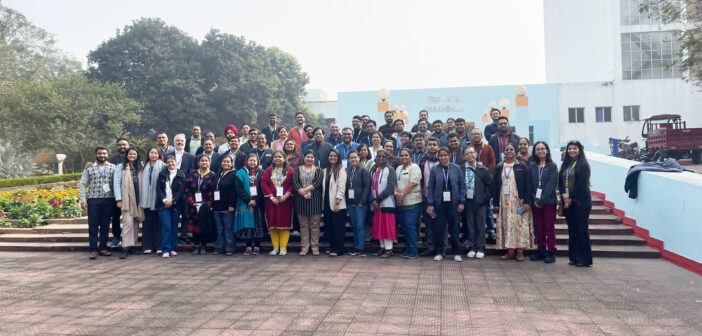Rooted in the philosophy of Lehigh’s Office of Creative Inquiry, a new social impact program is being implemented to take learning beyond the traditional four-walled classroom.
The Transformative Education for Sustainable Social Impact (TESSI) Institute is modeled after Lehigh’s Creative Inquiry program to help professors shift their curriculum from chalkboard-based learning to real-world application.
Khanjan Mehta, a co-creator of the program and the vice provost for Creative Inquiry at Lehigh, said the goal of the institute is to help professors implement social impact programs at their respective universities and build collaborative relationships with their students.
TESSI’s inaugural conference took place in West Bengal, India, from Jan. 15 to 19.
Lehigh partnered with Indian Institute of Technology, Kharagpur, a top engineering and technology university in West Bengal, India, for this project. IIT Kharagpur reached out to Lehigh faculty to collaborate on an intensive for their professors to better address social issues in their academic curriculum. From this partnership, TESSI was created.
Sixty-five participants, mostly made up of professors from India and a few from the Philippines and Hong Kong joined four Lehigh staff for a week of workshops, panels and project brainstorming.
“TESSI is a really good way to build our network amongst the best-of-the-best faculty that are interested in this kind of social impact,” Mehta said.
Many of the professors who took part in the conference have already led sustainability and problem-solving initiatives in their own communities.
William Gaudelli, a member of TESSI’s organizing team and the dean of the College of Education, said addressing relevant social problems in India was a primary goal of the program.
“We had a great talk by a faculty member locally from IIT Kharagpur who’s doing work on air sampling throughout India,” Gaudelli said. “They created relatively low-cost instrumentation for local testing of air quality, collected data and attempted to act on that data.”
The team of organizers also included Willy Das and Saif Mir from Lehigh, as well as Bhaskar Bhowmick, Suman Chakraborty, Monoj Kumar Mondal and Prabha Bhola from IIT Kharagpur. Mehta said co-creating the program with local experts was a priority for this initial TESSI Institute and all future institutes.
At the conference, participants worked in groups to design interdisciplinary programs they could implement at their home universities.
Prakash Hegade, a participant and professor at KLE Technological University in India, helped design a one-year program centered on heritage, arts and cultural experiences during the TESSI Institute. Hegade shared positive sentiments surrounding the conference and implementing an interdisciplinary approach.
“The workshop gave us a canvas for program design,” Hegade said in an email interview. “I plan to start by introducing the relevant items (from the institute) into the project work of my courses.”
Guadelli said participants were engaged, and the subject matter of the conference was well-received.
The greatest challenge acknowledged by participants, however, was how to build a partnership with students, Mehta said.
“It’s not about faculty being at the center of the stage telling students how things should be, but faculty and students partnering to work on active projects, conducting research and building solutions that solve real challenges in the world,” Mehta said.
Leaders and participants found the solution to this challenge through storytelling.
“I think what made all the difference in the world were the stories,” Mehta said. “We had an entire session on storytelling.”
He said stories helped people see one another as multifaceted human beings and thinkers, as opposed to identifying students solely by their major.
Mehta challenged participants to think about their relationships with students who went on to do remarkable things and reflect on what aspect of that relationship made the student most successful.
“That transformation of (students’ success) had nothing to do with the course content and everything to do with how the faculty helped students build their confidence, self-efficacy, sense of identity and purpose,” Mehta said.
With workshops on topics like storytelling, conference leaders encouraged participants to reinvent their outlook on what a classroom looks like working more collaboratively with students.
Many participants are now working on adapting curricula in their universities to emphasize social impact, sustainability and interdisciplinary problem-solving.
The hope for the future is to implement real-world problems in curricula around the world, like what is being done at Lehigh within Creative Inquiry, and to inspire a generation of “future makers” worldwide.
“Future makers” is a well-known phrase at Lehigh and a motto professors in many disciplines use to inspire their students. It is now a motto that is gaining international recognition for Lehigh, as IIT Kharagpur and others are interested in creating a similar impact.
Innovation is critical for solving problems that are not isolated to just one country, such as climate change and pollution.
“It’s one planet, and we’re all in it,” Mehta said. “We need a lot of universities to have programs that focus on preparing students to lead lives of impact and address climate change and food security because that’s not one person’s job.”
To reach more professors and students, Mehta and others are working to make the TESSI workshops and material available online for professors globally.
Until then, the team will continue to hold conferences around the world. The next conference will be held in the Philippines in March, and there will be five others this year, four in India and one in Colombia.






Comment policy
Comments posted to The Brown and White website are reviewed by a moderator before being approved. Incendiary speech or harassing language, including comments targeted at individuals, may be deemed unacceptable and not published. Spam and other soliciting will also be declined.
The Brown and White also reserves the right to not publish entirely anonymous comments.